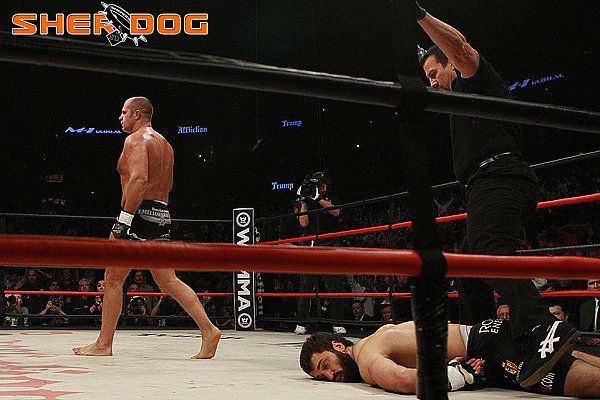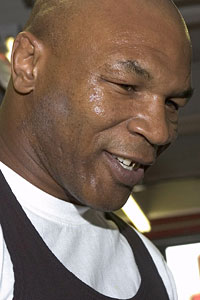A Tale of Two Heavyweight Championships
Jason Probst Jun 26, 2010

Fedor Emelianenko (left) file photo: Dave
Mandel/Sherdog.com
Who’s the heavyweight champion of the world?
Advertisement
With the public, perception is reality, and the dueling legacies of the UFC and Fedor Emelianenko are on decidedly different trajectories. Particularly with regards to capturing what is still the most coveted crown in sports: heavyweight champ.
The bookended Emelianenko-Fabricio
Werdum (Saturday) and Brock
Lesnar-Shane
Carwin bouts (July 3) are fitting examples of how, as time
marches on, the UFC’s decision to not sign Emelianenko was
eminently correct.
Given terms that the company brass refused to bend on (namely, allowing Emelianenko’s handlers, M-1 Global, co-promotion), it’s further proof that taking the long view and building for the future strengthens your positions considerably. Meanwhile, going all-in on one fighter merely for the sake of securing a big name is an increasingly vexing proposition.
In short, if the heavyweight title is the mantle that drives the fight game, the public’s perception of a promotion’s champion in turn accords a key legitimacy and recognition of the organization. Or lack thereof. That’s why a comparison of where the UFC and Strikeforce have progressed since the last Fedor Sweepstakes (last August) shows that thinking long-term isn’t always about the obvious factors at hand.
Since Strikeforce won the Fedor Sweepstakes -- a mixed blessing, given the problems virtually every promotion has had in dealing with M-1 -- the San Jose-based promotion has not capitalized on what seemed a remarkably audacious coup. After snatching the game’s best fighter and long-dominant heavyweight, it seemed that Strikeforce was positioned to finally run with the big boys. Yet the Fedor acquisition has provided only a negligible boost to his profile as the world’s premier heavyweight. He’s fought just once since signing nearly 10 months ago -- a win over Brett Rogers that was somewhat devalued by Alistair Overeem, who demolished Rogers in one round last May. He’ll have his second fight Saturday, with the inevitable toxicity of M-1 a source of constant rumors regarding whether or not they’re happy with Strikeforce. It’s a train that’s never late.

Thierry
Gourjon/Splash News
knew who was the champ.
In the public’s eye, the UFC has effectively kept pace. Whether it’s Lesnar-Fedor that’s the ultimate dream match, or Carwin-Fedor, or Velasquez-Fedor, etc., there’s a common theme here: The UFC can afford for its heavyweight champion to lose. M-1 cannot, at least in terms of negotiating the eventual appearance of Fedor in the UFC. Strikeforce is stuck somewhere in the middle, hoping to simultaneously build its brand while clearly feeling the queasy feelings mustered up by the likes of Rogers, who in November supplied some Rocky Balboa-like upstart drama in giving Fedor a lively tussle before the champion rallied with a massive knockout.
Since Fedor’s signing, the UFC has built an emerging roster of marketable and capable contenders. Meanwhile, Strikeforce cannot seem to match Emelianenko with Overeem, the one heavyweight on its roster who would rate less than 5-1 at the betting window. It’s as though Strikeforce has the biggest hammer in the sport, yet can only swing it once M-1 has been pleased.
The two promotions may not necessarily have the same objectives with regards to Fedor. Strikeforce wants to build its brand on the back of the game’s greatest and longest dominant product; M-1 has made it clear it is out to maximize Fedor’s earning power and build its own brand, which may not necessarily come via Strikeforce. This is almost always a recipe for friction.
Fedor is in a no-win situation Saturday with the long-shot Werdum challenging him. A close match only serves up more fodder for critics asking why he won’t face the best competition, while a blowout merely reinforces the fact that he needs better dance partners.
Dave
Mandel/Sherdog.com
to unify UFC titles on July 3.
Ditto for Lesnar, whose name already resonates far more readily among casual sports fans than Fedor’s. The UFC has also built up a solid cast of meaningful, marketable contenders, all of whom can be readily plugged in as the next challenger. Cain Velasquez scored a huge victory (both career and succession-wise) over Antonio Rodrigo Nogueira in February. As an unbeaten Mexican-American, he is a promotional dream, given the massive potential for crossover with the Latino community.
Junior dos Santos, who stopped Werdum in his UFC debut, has emerged as a virtual mirror of Velasquez. He faces TUF winner Roy Nelson on Aug. 7 in the kind of hard-nosed matchmaking that used to define boxing but is now the expectable province of MMA and resonates with fans. You can’t fake credible matchmaking and contender-building, and there’s only so long that the veneer of greatness can co-exist with a smoke-and-mirrors approach while resting on past laurels.
At 31-1, Fedor has been an amazing fighter, blending a mix of technical genius and unbending will to win. Since his punishing decision win over Nogueira in 2003 to take the Pride belt (and widely perceived “true” championship of the sport), the influx of better fighters and athletes into MMA has probably covered more ground in seven years than the NFL or NBA saw in three decades.
Watch the heavyweights of the early 2000s, and it almost seems like a different game, one far more reductive and predictable. Whether a big man wrestled or kickboxed as his “core art,” their other skills were largely a primitive means toward applying the superior ones. Today’s fighter has the benefit of additional training with an eye toward MMA in the key formative years. And the UFC has built up a deep enough roster that it can continue to wait for Fedor and his handlers to reduce their bargaining position.
M-1 Global apparently did not get the memo that the UFC is not in the business of being strong-armed -- they’re typically the ones doing it -- and the M-1 negotiating position will never be better than what it was during last summer’s pithy go-round of courtship.
While Fedor fights semi-annually against a bare cupboard of opponents, his legacy, while unmatched, only becomes more of a past-tense collection of memories. In the meantime, the UFC can play musical chairs and continue to grind away at the public’s perception of who the “real champion” is. Fedor has done amazing things, and may well be the greatest fighter in the history of the sport, especially considering the size he concedes to his bigger opponents. But just because you’ve been the greatest doesn’t mean you get a pass on proving it in the here-and-now -- particularly if you still want to be known as such.
If you’re calling yourself the best, you owe it to the fans to prove it. It doesn’t mean Fedor should sign his life over to the UFC; but it could very well mean that the negotiating position he thought he had last summer is never going to improve and, with each outing, only weakens as his profile pales in comparison to a revamped and contender-heavy UFC heavyweight division.
It’s a tale of two Saturday nights, and over a long enough timeline, ask yourself how many upsets both promotions can sustain. For the UFC, it’s a non-question. They’ll endure no matter what big-man permutations ensue.
For Strikeforce and M-1, the ice is getting thin. Werdum is the perfect foil for Fedor (at least the prime version we know). There’s nothing wrong with the game passing you by -- great athletes and fighters have dealt with this since the inception of competition. But you have to face the best to keep claiming you’re the best, and for Fedor, Saturday night only pushes the envelope on how long you can keep claiming it without actually putting it to the test.
Related Articles







